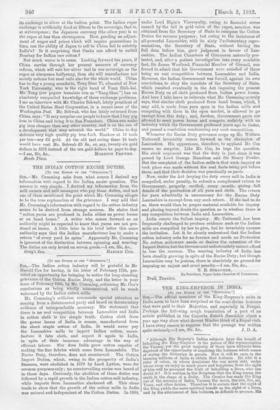[To THE EDITOR OP TRH SPNCTATOR."] SIR, — The Indian cotton industry
will be grateful to Mr Harold Cox for having, in his letter of February 17th, pro- vided an opportunity for bringing to notice the long-standing grievance of the Cotton Excise Duty, and the letter in your issue of February 24th, by Mr. Cumming, criticising Mr. Cox's conclusions as being wholly misconceived, will be much welcomed by the Indian cotton mills.
Mr. Cumming's criticism commands special attention as coming from a disinterested party and based on documentary evidence of unimpeachable accuracy. His statement that there is no real competition between Lancashire and India in cotton cloth is the simple truth. Cotton cloth from the power looms of India is coarse, manufactured from the short staple cotton of India. It would never pay the Lancashire mills to import Indian cotton, manu- facture it into cloth, and export it again to India, in spite of their immense advantage in the way of efficient labour. Nor does India grow cotton capable of making the fine fabrics which come from Lancashire. The Excise Duty, therefore, does not countervail. The Cotton Import Duties, which, owing to the prosperity of India's finances, were abolished in 1879 by Lord Lytton, were for revenue purposes only ; no countervailing excise was heard of in those days. Curiously, the abolition of these duties was followed by a rapid growth in the Indian cotton mill industry, while imports from Lancashire slackened off. This alone tends to show that the growth of the cotton mills in India was natural and independent of the Cotton Duties. In 1894, under Lord Elgin's Viceroyalty, owing to financial stress caused by the fall in gold value of the rupee, sanction was obtained from the Secretary of State to reimpose the Cotton Duties for revenue purposes ; but owing to the insistence of all-powerful Lancashire, with its sixty Parliamentary repre- sentatives, the Secretary of State, without having the full data before him, gave judgment in favour of Lan- cashire. The Indian Chambers of Commerce naturally pro. tested, and, after a patient investigation into every available fact, Sir James Westland, Financial Member of Council, was forced to admit that his Government were satisfied of there being no real competition between Lancashire and India. However, the Indian Government was forced, against its own convictions, to obey the mandate of the Secretary of State, which resulted eventually in the Act imposing the present Excise Duty on all cloth produced from Indian power looms. And here I take leave to reiterate what Mr. Cumming so truly says, that similar cloth produced from hand looms, which, I may add, is made from yarn spun in the Indian mills and competing with them in the open market, is allowed to go exempt from this duty ; and, further, Government gaols are allowed to erect power looms and compete unfairly with an industry which the Government professed years ago to foster, and passed a resolution condemning any such competition.
Whenever the Excise Duty grievance crops up Mr. William Tattersall invariably comes forward as the champion of Lancashire. His appearance, therefore, to applaud Mr. Cox causes no surprise. Like Mr. Cox, he begs the question. His stock argument was that the duty is just, since it was passed by Lord George Hamilton and Sir Henry Fowler. But the complaint of the Indian mills is that such inquiry as took place was made without the real facts being put before them, and that their decision was practically ex pane.
Now, under the Act levying the duty every mill in India is compelled, under penalty, to submit a complicated return to Government, properly verified, every month, giving full details of the production of all yarn and cloth. The return for yarn admittedly is unnecessary for the Excise Duty Lancashire is exempt from any such return. If she had to do so, there would then be proper material available for inquiry and placing beyond doubt the question as to whether there is any competition between India and Lancashire.
India courts the fullest inquiry. Mr. Tattersall has been frequently challenged to produce evidence such as the Indian mills are compelled by law to give, but he invariably excuses the invitation. Let it be clearly understood that the Indian cotton industry asks for no favours and needs no Protection No cotton millowner needs or desires the retention of the Import Duties, but the Government unfortunately cannot afford to lose the revenue. The weaving industry of India has been steadily growing in spite of the Excise Duty; but though Lancashire may be jealous, there is absolutely no ground for imposing an unjust and cruel penalty.—I am, Sir, &c., T. E. STRACHEY,
Ex-Proaident, Upper India Chamber of Commerce.
Trull, Taunton.










































 Previous page
Previous page